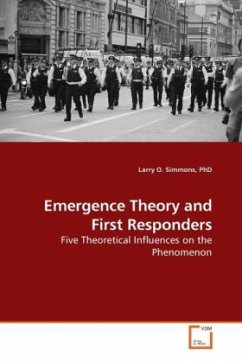A main component of homeland security is the deployment of law enforcement officers from a region as the first line of defense against natural disasters or terrorist attacks. This requires first responders to converge from multiple law enforcement agencies that are conditioned to operate in varying performance environments. Emergence theory postulates the sum of the parts of a system do not necessarily comprise the sum of the whole system. If this proposition is valid, the collection of parts taken from different systems, do not, in and of themselves, constitute a new system, this study analyzed five theoretical perspectives that provide insight into the phenomenon of the emergence of first responders. Furthermore, this study collected data from first responders functioning in their natural performance environments to gain insight into how the five theoretical perspectives relates to the emergence of regional first responders.
Bitte wählen Sie Ihr Anliegen aus.
Rechnungen
Retourenschein anfordern
Bestellstatus
Storno








